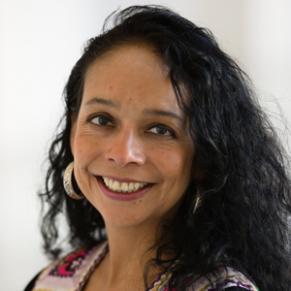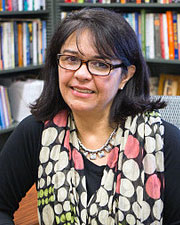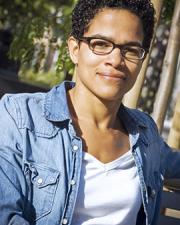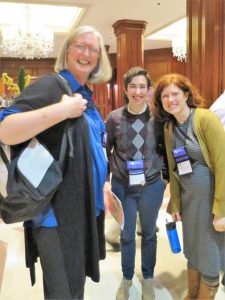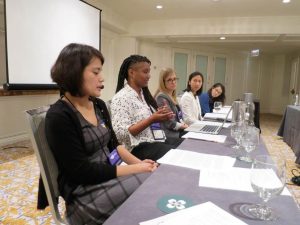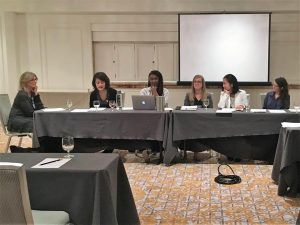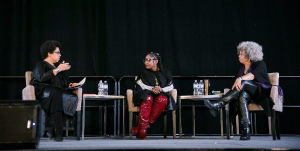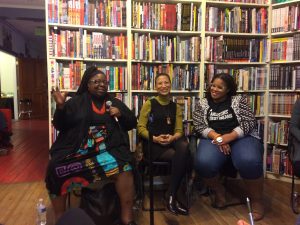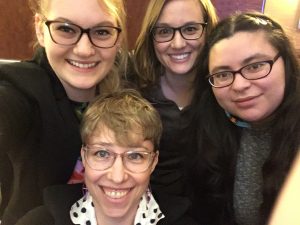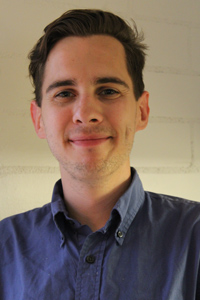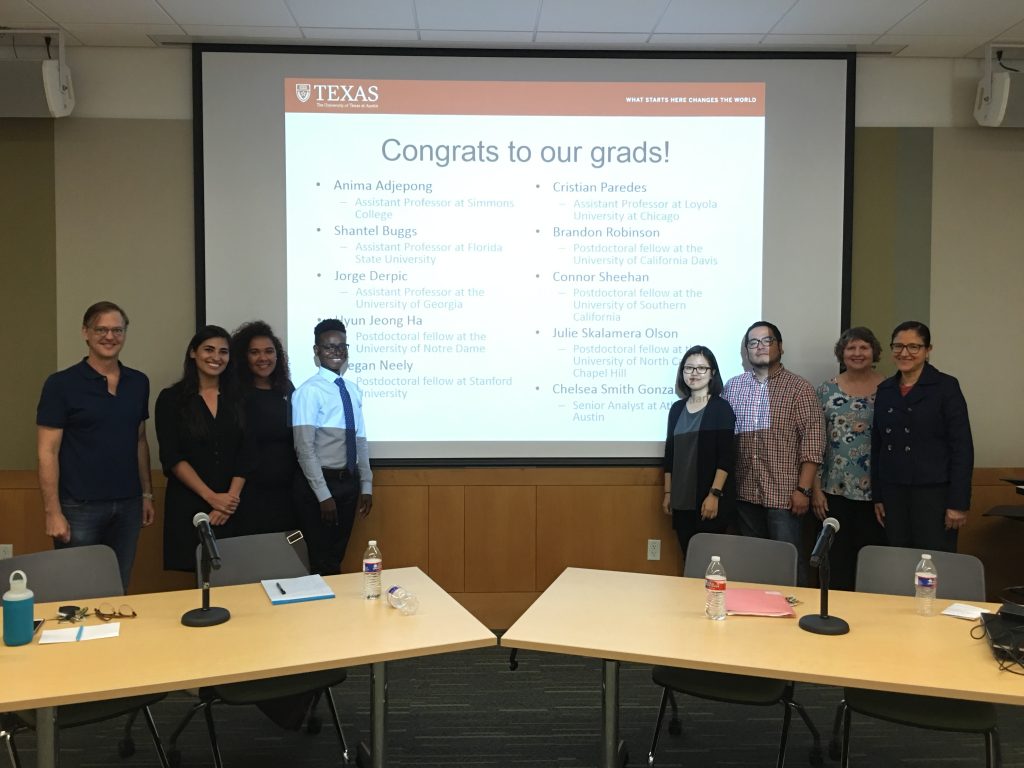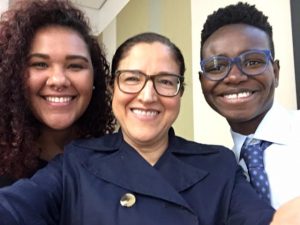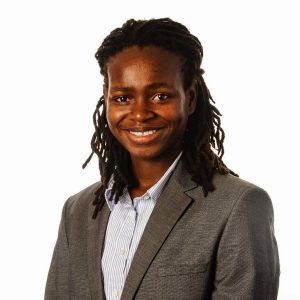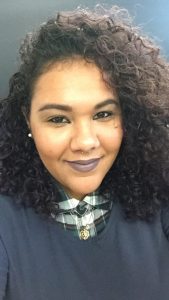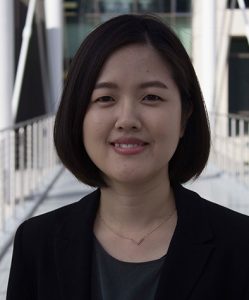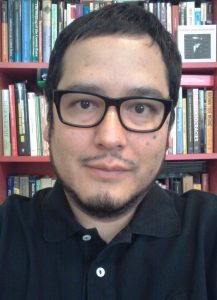By Derek Sandoval, UT Austin Sociology Graduate Program
Popular police reform often takes the form of body worn cameras and implicit bias training. These strategies focus on the individual, with the implication that there are just a few bad apples in need of reformation. However, these reforms fail to address the rotten tree—the very institution of policing—that produces the fruit.
Through his research, Dr. Rashawn Ray, Professor of Sociology and Executive Director of the Lab for Applied Social Science Research at the University of Maryland at College Park and a David M. Rubenstein Fellow at The Brookings Institution, indicates the shortcomings of such reforms and addresses the mechanisms tied to the core of policing that perpetuate racial and social inequality. Dr. Ray’s work also emphasizes the power of racial uplift activism and social policy to combat inequality.
On September 17, Dr. Ray presented his work, “Systematic Racism in Policing: How Bad Apples Come from Rotten Trees” for the UT Austin Department of Sociology’s Colloquium Series. Within his presentation, Dr. Ray discussed the evolution of #BlackLivesMatter, racializing the criminal justice system, the social psychology of criminalization, police views on BLM, his results from an extensive police-civilian body camera study, implicit bias and virtual reality decision-making training, and policies aimed to improve relationships between police and civilians.
Dr. Ray demonstrated that the police operate on split-second decision-making informed by biases regarding race, and a lack of communication from the dispatcher. He reminded us of the immense impact social media has in exposing police brutality and state-sanctioned violence against Black people to the public and how it motivated mobilization through protests and policy advocacy work. He warned us of the lack of accountability police departments face for their violence, and what can be done for a better future.
Below are just a few takeaways from Dr. Ray’s presentation:
- Social media analysis is crucial for studying social movements and effecting policy changes.
Dr. Ray stresses that the United States is currently experiencing not one, but two pandemics, the first being COVID-19, and the second, an awakening that, mostly white Americans, as many Black communities were already forced to confront this reality—are facing, as they are confronted with massive exposure to a hostile and racist society through the police and other forms of structural violence against Black communities: Racism in the United States is a problem. Social media such as Twitter, Facebook, Instagram, YouTube, etc., are the primary vehicles that carry this exposure through images and videos and stories capturing state-sanctioned violence of the police that targets Black people and Black communities.
As police departments try to push their own narratives that herald law enforcement as the friendly neighborhood cop, social media can also reveal a different reality (cw: police brutality, gunshots, injuries, violence against minors). Similarly, social media shows the work of activists, protests across the nation, and the formation of a collective identity, such as the growth from #BlackLivesMatter to the social movement of Black Lives Matter. And if utilized correctly, that exposure and identity can open a policy window. That is, as these issues come to the eye of the public, policy solutions can be attempted with majority public support.
2. Police departments are not held accountable for their violence.
There are no fiscal consequences for police departments after an “officer-involved shooting”—a term deployed after an officer shoots a civilian (Durán, 2016). In fact, qualified immunity makes it difficult to hold police legally responsible for many of their misdeeds (Fisher, 2020). Instead, cities use taxpayer money to pay for civil lawsuits against police departments (Ray, 2020). If the family of the deceased lived in the same city as the victim of police violence, that means that if they successfully sued the police department for the death of their family member, some part of that already small payout came out of their pockets.
Those funds that could be going to public libraries, public education, public works, or resources for low-income neighborhoods is instead used when law enforcement kills someone. The police are not held accountable, and do not have an incentive to hold themselves accountable for their actions.
3. Changes aimed at individual officers are ineffective.
Implicit bias training is often suggested in police reform. It is implemented with the goal that officers will recognize and manage their unconscious racial biases through education and discussion (Lee Jackson, 2018). After conducting thorough investigations with the Lab for Applied Social Science Research through leading implicit bias training courses with approximately 2,500 police officers, however, Dr. Ray suggested that officers do not recognize their own prejudices through implicit bias training. And after putting officers through 90 virtual reality scenarios, Dr. Ray concluded that while we can control for explicit bias, implicit bias will remain.
Similarly, Dr. Ray found that body cameras may be ineffective. While the desire of body cameras revolves around accountability, regulations vary, and access to the general public is limited (Ray, 2020; Ray, Marsh, & Powelson, 2017). What do body cameras and implicit bias training have in common? They’re both solutions that attempt to change the individual officer’s behavior, rather than addressing the structure and culture of policing. The goal then becomes to reform the rotten apple, rather than to toss rotten fruit. Or, perhaps, even uproot the rotten tree that produced the fruit (McDowell, & Fernandez, 2018).
Dr. Ray emphasized the importance of action. He works toward policy advocacy and reform, yet doesn’t discourage abolition. Rather, he pointed out in the Q&A portion of the presentation, as abolition is pursued, policies can be as well. Many of these policies are based around increasing accountability for police departments, such as restructuring the civilian payout process in instances of police misconduct from taxpayer money to police departments, and firing police officers who abuse their power.
In a time of two pandemics, in which technology has laid bare to the nation the clear and precedent threat that is the police, Dr. Ray’s presentation is a necessary reminder of what the police are, what we cannot do to change them, and perhaps, how we can begin to hold them accountable.
References
Durán, R. (2016). NO JUSTICE, NO PEACE: Examining Controversial Officer Involved Shootings. Du Bois Review: Social Science Research on Race, 13(1), 61-83. doi:10.1017/S1742058X16000059
Fisher, J. M. (2020). Shoot at Me Once: Shame on You! Shoot at Me Twice: Qualified Immunity. Qualified Immunity Applies Where Police Target Innocent Bystanders. Mercer Law Review, 71(4), 1171–1190.
Lee Jackson, J. (2018). The Non-Performativity of Implicit Bias Training. Radical Teacher, 112, 46–54. https://doi-org.ezproxy.lib.utexas.edu/10.5195/rt.2018.497
McDowell, M. G., and Fernandez, L. A. (2018). ‘Disband, Disempower, and Disarm’: Amplifying the Theory and Practice of Police Abolition. Critical Criminology, 26(3), 373–391. https://doi-org.ezproxy.lib.utexas.edu/10.1007/s10612-018-9400-4
Ray, R. (2020), Restructuring Civilian Payouts for Police Misconduct. Social Forum, 35: 806-812. doi:10.1111/socf.12618
Ray, R., Marsh, K., and Powelson, C. (2017). “Can Cameras Stop the Killings? Racial Differences in Perceptions of the Effectiveness of Body‐Worn Cameras in Police Encounters.” Sociological Forum 32: S1: 1032–1050. https://doi-org.ezproxy.lib.utexas.edu/10.1111/socf.12359.

